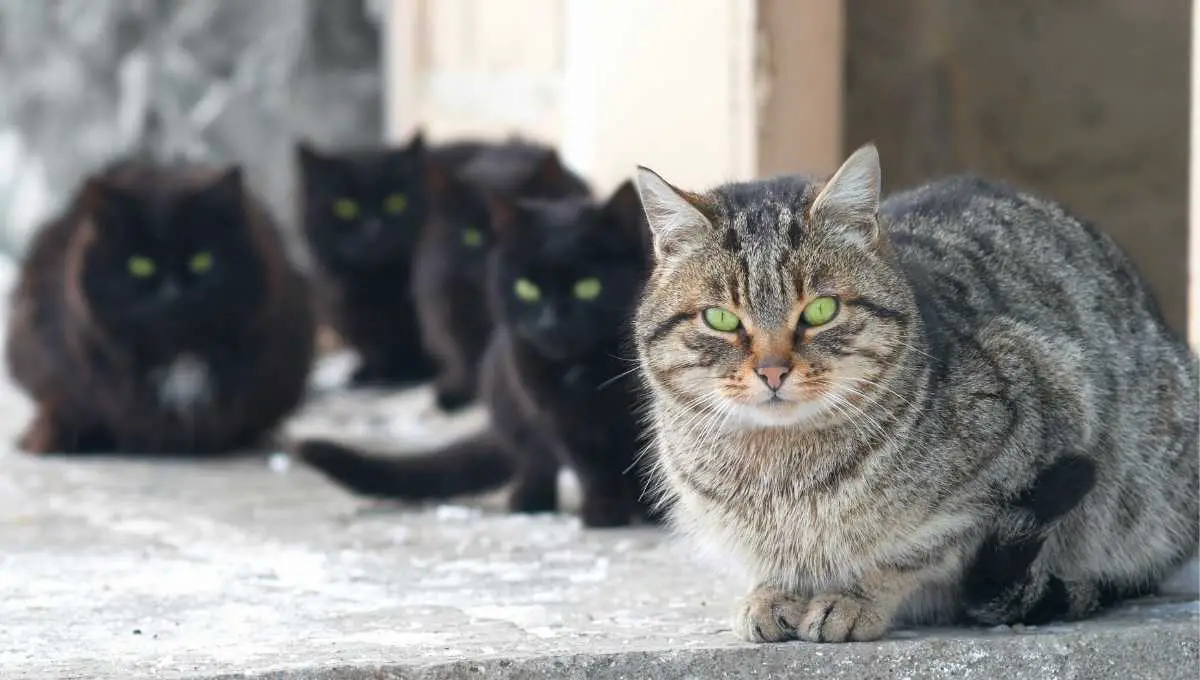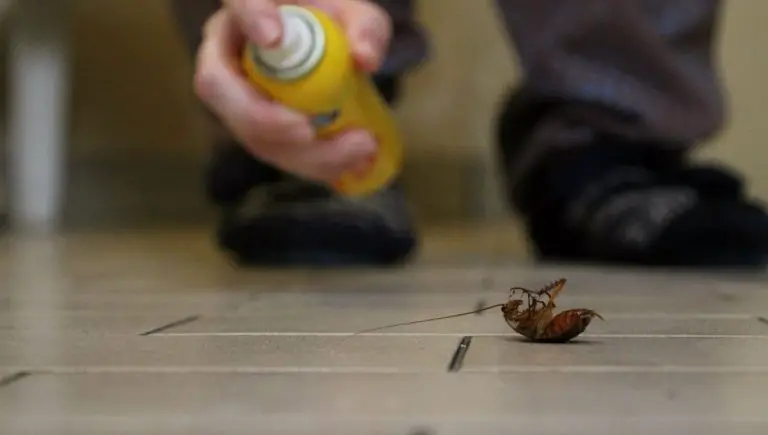Neighbor Has Too Many Cats: What Should I Do?

Having multiple cats as pets can be a great and rewarding experience. There are some cat owners that tend to take the “more the merrier” approach to owning cats however. When it gets to this point, things can easily get out of hand and turn into a nuisance. If your neighbor has too many cats, you might end up being the one dealing with the trouble. What can you do about it though?
If you think that your neighbor has too many cats, unfortunately there’s not much you can do about it. If however the cats are not in good condition or their owner can’t keep up with their maintenance, you can report the owner to animal services or the local health department.
For cat lovers, there’s no such thing as keeping “too many” cats. However, if the cats prove to be a nuisance, there are steps you can take to deal with the issue, which will be discussed in this article.
You might also enjoy our post on How to Feed Outdoor Cats While on Vacation
How Many Cats Is Too Many by Law?
When keeping cats, “too many” can be subjective. To one person, having two cats is already considered “too many,” while others may think having nine cats is not enough.
Taking care of a lot of cats is acceptable as long as the owner can provide for their food and shelter. More importantly, the owner should be responsible for “fixing” the cats, or have them neutered and spayed so they won’t reproduce.
How Many Cats Can You Own?
Depending on the state, the limit and restrictions of pet keeping will depend on certain factors, such as the size of someone’s home or number of people living inside the house. For instance, one can only have two or three cats and anything more than that will require a special permit or a kennel license.
If you see your neighbor keeping more cats than the law allows, know beforehand if they had obtained a license to keep them. It’s a different story when you observe your neighbor seemingly neglecting the cats, or failing to take care of them.
If you spot signs of animal neglect, that would be a great time to bring up the authorities.
Health Risks of Having Too Many Cats
While having cats around can be exciting, pet owners should keep in mind cats’ effect on human health. Felines are known to harbor parasites that can cause diseases in humans (more on this will be discussed below). And if there are just way too many cats around, that increases the risk of transmission.
Not only that, having too many cats can also be damaging to other cats around. Take for example, a hoarder who keeps more than 20 cats in her home. It would be impossible to clean up after 20 cats and make sure the litter box is clean every single day.
Veterinary care doesn’t come cheap and if several cats fall sick, that would be an overwhelming expense. And if the owner fails to keep up with the cat care, cats can develop diseases that can spread to other cats – even to other cats in the neighborhood.
Diseases Humans Can Get From Cats
Having too many cats in one place will increase the risk of disease transmission among the group, since it would be hard to keep up with their treatment and routine vaccinations. But other than spreading disease among each other, cats can also transmit diseases to humans.
Cats are known to carry Toxoplasma gondii, a parasite that can cause toxoplasmosis, which is a disease that affects the brain. People with weak immune systems (such as those with HIV/AIDS, elderly, children, or pregnant women) who get infected with the parasite will develop problems such as brain swelling and also eye damage.
Another health risk is allergies and the respiratory system. Anyone who visits someone with too many cats can pick up pet dander easily and catch allergies. In addition, too many cats equate to a home that reeks of urine and excrement. The stench can also trigger respiratory problems, especially in people with pre-existing illnesses.
You might also enjoy our post on Do Cats Have Kittens in the Winter?
What Can I Do About My Neighbors Cats?
If, unfortunately, you have a neighbor who keeps a lot of cats and does not seem to take care of it properly, you could be on the receiving end of so many problems. For one, the cat might wander into your property to urinate and poop.
This becomes a real problem if you are trying to maintain a well-manicured lawn. The cat’s pee and excrement can quickly kill off the grass on your lawn. Not only that, you will be given the task to clean up after someone else’s pet.
It’s another problem if your neighbor’s cat that is unspayed wanders into your home and decides to turn it into its new birthing place. You could be having kittens on your property.
If a neighbor’s cats on my property are giving me a headache, I would definitely take action immediately. One of the things you can do is to go up to your neighbor and tell them straight about their cat problem.
In a calm and assertive tone, inform your neighbor that their cat is giving you extra work with their waste on your property. If you’re maintaining your lawn, let them know as well since it’s no joke having to spend money to have a beautiful yard. You can politely tell your neighbor to keep the cats inside.
If this turns out to be a pointless request and it seems that your neighbor doesn’t want to do something about the cat problem, it’s time to contact the local animal services.
Do keep in mind, however, that sometimes, the animal services may not be able to help you as well. In that case, take the matter to the local council, stressing out that the cats have proved to be nuisances.
Humanely trapping cats that end up on your property is also another option that some homeowners have used. However, this should be done with caution. In some areas, this is acceptable but always check with your local laws since some areas prohibit trapping cats that are owned.
It’s also a good idea to give your neighbor a head’s up that you’re putting humane traps on your property. If you’ve caught a cat on your property, you can surrender it to the local shelter and let them know it’s someone else’s. That way, they can contact the owner and perhaps talk to them about responsible ownership.
Under any circumstances, never harm your neighbor’s cat, even if they are on your property. Also, don’t abandon them by leaving them trapped. And while you’re dealing with a trapped cat, make sure you are also being careful not to get scratched or bitten.
You might also enjoy our post on Should You Feed Your Neighbor’s Cat?
How Many Animals Is Considered Hoarding?
It’s hard to tell specifically just how many is “too many” to be considered hoarding when it comes to keeping cats. For one person who has a big space, and can afford veterinary bills and the overall management of cats, 20 could be acceptable.
However, the term animal hoarding is more on the negative side since it equates to animal neglect. Animal hoarding usually involves keeping pets in poor conditions; pets are not given proper care and food and shelter are not adequately provided.
If a person keeps more cats than he can care for, such as being unable to keep up with the animals’ food and medical needs, that is already considered hoarding. An animal hoarder is also in denial of the animals’ horrid conditions; he or she fails to see that one or more animals are in need of serious attention.
How Do I Report Too Many Cats?
As mentioned, animal hoarding is considered animal cruelty since it’s a form of neglect. If you notice that your neighbor is keeping too many cats that are in bad condition, you can report the person. You can contact the local humane society to give a tip. The staff should then set off to conduct an investigation.
When to Call Animal Control on a Neighbor?
But how do you know when to call animal control or the humane society on your neighbor? How can you be sure if the cats are indeed being neglected? Here are some signs to watch out for, according to the ASPCA:
- You see your neighbor keeping way too many animals – more than they can actually count
- Your neighbor’s home is in bad shape or deteriorating – watch out for broken windows, clutter, etc.
- The cats show physical signs of neglect and poor nutrition – such as skinny, lethargic cats
- You will spot vermin and fleas in the home
- The place reeks of ammonia and you see pee stains or dried poop on the floor
- Your neighbor looks unsocialized and is in need of care himself
- Your neighbor insists the cats are in excellent condition even though it’s clear as day that they’re not.
You might also enjoy our post on What to Do if Neighbors Have Too Many Dogs
Conclusion: What to Do If Your Neighbor Has Too Many Cats
If your neighbor has too many cats, the first thing you should do is to research the local laws on the number of pets a household can legally keep. The general idea is that keeping two or three pets is acceptable and more than that will require a special kennel permit. Keep in mind, however, that not all pet owners register their pets.
Observe how your owner treats the cats. If the cats are in excellent condition and you and everyone else can see that they’re being cared for, then the best thing you can do is talk to the owner. Inform the owner if the cats are causing you trouble, such as defecating or urinating on your lawn.
If, however, you can spot signs of neglect such as emaciated look on cats or if the owner and his home are in bad shape, then contact the local animal services so they can start their investigation.






